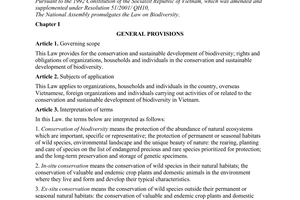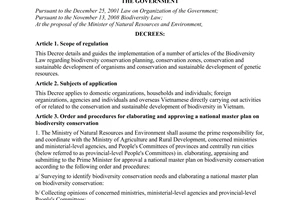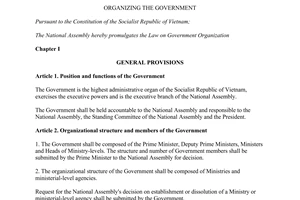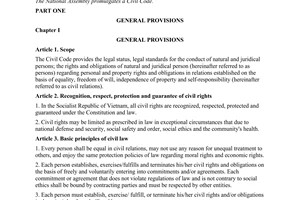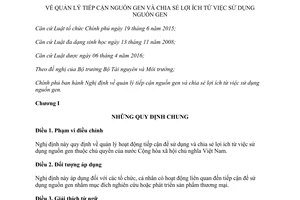Nội dung toàn văn Decree 59/2017/ND-CP 2017 management access genetic resources benefit sharing arising utilization
|
THE GOVERNMENT |
SOCIALIST
REPUBLIC OF VIETNAM |
|
No. 59/2017/ND-CP |
Hanoi, May 12, 2017 |
DECREE
ON MANAGEMENT OF ACCESS TO GENETIC RESOURCES AND BENEFIT SHARING ARISING FROM THEIR UTILIZATION
Pursuant to the Law on Government Organization dated June 19, 2015;
Pursuant to the Law on Biodiversity dated November 13, 2008;
Pursuant to the Law on Pharmacy dated April 06, 2016;
At the request of the Minister of Natural Resources and Environment;
The Government promulgates a Decree on management of access to genetic resources and benefit sharing arising from their utilization.
Chapter I
GENERAL PROVISIONS
Article 1. Scope
This Decree deals with management of access to genetic resources and benefit sharing arising from their utilization under the sovereignty of the Socialist Republic of Vietnam.
Article 2. Regulated entities
This Decree applies to organizations and individuals involved in access to and utilization of genetic resources for the purposes of research or commercial product development.
Article 3. Definitions
For the purposes of this Decree, the terms below shall be construed as follows:
1. “Provider” is an entity appointed by the State to manage genetic resources as specified in Clause 2 Article 55 of the Law on Biodiversity.
2. “User” is an entity engaging in access to genetic resources for their utilization under the sovereignty of the Socialist Republic of Vietnam.
3. “Third party” is an entity involved in access to genetic resources for their utilization and derivatives thereof to which the User that permitted by a competent State authority (hereinafter referred to as "permitting authority”) transfers.
4. “Biotechnology” means any technological application that uses biological systems, living organisms, or derivatives thereof, to make or modify products or processes for specific use.
5. “Internationally Recognized Certificate of Compliance with access to genetic resources and benefit sharing (IRCC)” is a record generated when the national focal point publishes a permit for access to genetic resources and Mutually Agreed Terms for access to genetic resources and benefit sharing on the Access and Benefit-sharing Clearing-House (ABSCH) of the Secretariat of the Convention on Biological Diversity.
6. “Derivative” is a naturally occurring biochemical compound resulting from the genetic expression or metabolism of biological or genetic resources, even if it does not contain functional units of heredity.
7. “Permit” means a permit that is issued by a competent authority to allow a user to access genetic resources for commercial research or non-commercial research purposes; or for commercial product development purposes.
8. “Mutually Agreed Terms (MAT)” means an agreement between the Provider of genetic resources and the User on the terms and conditions of access and use and the benefits to be shared between both parties.
9. “Nagoya Protocol” is a protocol on access to genetic resources and the fair and equitable sharing of benefits arising from their utilization, which is a supplementary agreement to the Convention on Biological Diversity.
10. “Origin of genetic resources” is a place/country where either the genetic resources are obtained from the wild or they are domesticated and cultivated for a long time.
11. “Utilization (of genetic resources)” means to conduct research and development on the genetic and/or biochemical composition of genetic resources and derivatives thereof, including through the application of biotechnology as prescribed herein.
Article 4. Rules for managing access to genetic resources and benefit sharing arising from their utilization
1. The Vietnamese State shall exercise sovereignty over all genetic resources in the Vietnamese territory.
2. The foreign User is only entitled to engage in access to genetic resources after being permitted by a permitting authority.
3. Vietnamese organizations and individuals are encouraged to participate in research and development on genetic resources.
4. The benefit sharing arising from the utilization of genetic resources shall be fair and equitable among relevant parties and shall contribute to the effective management of biological resources, promote the scientific research and the commercialization of genetic resources and focus on the role of indigenous and local communities in conservation and sustainable utilization of genetic resources.
Article 5. Implementation of the Nagoya Protocol by a national focal point
1. The Ministry of Natural Resources and Environment shall act as the national focal point to implement the Nagoya Protocol.
2. Responsibilities of the Ministry of Natural Resources and Environment:
a) Ensure consistency in management of issuance, extension and revocation of the permit;
b) Act as a focal point for information exchange with the Secretariat of the Convention on Biological Diversity through the ABSCH as specified in the Nagoya Protocol; take charge of the preparation for the national report on the implementation of the Nagoya Protocol in Vietnam; propose and recommend the implementation and implement decisions of the Conference of the Parties to the Nagoya Protocol as assigned by the Government; coordinate and fulfill national obligations to the Nagoya Protocol;
c) Cooperate with other countries in taking measures to implement the Nagoya Protocol applied to Vietnamese genetic resources in foreign countries; carry out the bilateral and multilateral international cooperation in access to genetic resources and benefit sharing.
Chapter II
ISSUANCE, EXTENSION AND REVOCATION OF PERMITS
Article 6. Permitting authorities
1. The Ministry of Agriculture and Rural Development shall issue, extend and revoke the permit relating to genetic resources of crop varieties, breeds of livestock and aquatic animals and varieties of forest trees.
2. The Ministry of Natural Resources and Environment shall issue, extend and revoke the permit relating to genetic resources not specified in Clause 1 this Article.
Article 7. Applicants for permits
1. The following entities shall register and apply for permits:
a) Vietnamese organizations and individuals that seek access to genetic resources for commercial purposes and commercial product development purposes;
b) Foreign organizations and individuals that seek access to genetic resources in Vietnam for any purposes;
c) Vietnamese organizations and individuals that wish to take genetic resources abroad, except for the cases specified in Article 20 this Decree.
2. The applicant for the permit who is an individual stated in Clause 1 this Article shall:
a) Obtain a degree (at least a bachelor’s degree) in either Biology, Biotechnology, Pharmacy or Agricultural Science;
b) Act as a member of a science and technology institution operating as prescribed in regulations of a country where such institution was established in the field of Biology, Biotechnology, Pharmacy or Agricultural Science and receive a written guarantee from such institution according to the Specimen No. 1 in the Appendix of this Decree.
Article 8. Requirements for applicants for permits
An applicant stated in Article 7 this Decree shall follow these steps when they seek access to genetic resources:
1. Register access to genetic resources with a permitting authority.
2. Negotiate and conclude the MAT with the Provider.
3. Have the MAT certified by the People's Committee of the commune.
4. Submit an application for the permit to the permitting authority.
5. Provide additional information and documents if requested by the permitting authority during inspection of the application for the permit.
Article 9. Registration of access to genetic resources
1. Organizations and individuals shall submit the application for registration of access to genetic resources (hereinafter referred to as "application for registration") to a permitting authority directly, by post or via the Internet.
2. The application for registration shall include:
a) A completed application form according to the Specimen No. 2 in the Appendix of this Decree;
b) A document proving the legal entity status as regulated by the law of a country where the organization was established; an original or a certified copy of either the passport, the identity card, the citizen card or other documents with a photo attached and personal information issued by a competent authority, which is still valid (hereinafter referred to as “identity papers”);
c) An agreement on cooperation with a Vietnamese science and technology institution if the applicant is a foreign entity;
d) A written authorization granted to a representative/representatives of an organization and individual if genetic resources belong to a common program, project or subject participated in by multiple organizations and individuals.
3. Within 10 days from the day on which the application for registration is received, the permitting authority shall send the applicant a written approval or rejection and provide explanation in case of rejection.
Article 10. Negotiation and conclusion of the MAT
1. After receiving the written approval from the permitting authority, the applicant shall negotiate and conclude the MAT with the Provider.
2. Contents of the MAT are specified in provisions of Article 15 herein.
3. In the cases where multiple organizations and individuals cooperate together in providing or accessing to genetic resources, they shall negotiate the terms and then enter into the MAT.
Article 11. Certification of the MAT
1. The MAT shall be certified by the People's Committee of commune where natural genetic resources are located or the headquarters’ address of the Provider was registered.
2. The application for the MAT certification to the People's Committee of commune shall consist of:
a) A copy of the written approval issued by the permitting authority;
b) The MAT concluded by and between the relevant parties;
c) An original of any of identity papers of the applicant.
3. The time limit for certifying the MAT is 3 working days from the day on which the application is received.
Article 12. Application for permits
1. The application for the permit shall be submitted to a permitting authority directly or by post. Such application shall include:
a) A copy of the written approval issued by the permitting authority;
b) The MAT concluded by and between the relevant parties and certified by the People’s Committee of commune;
c) A written approval granted by the managing authority as stipulated in regulations of law if the genetic resources are included in a list of conditional genetic resources;
d) Documents prescribed in Clause 2 Article 7 herein if the applicant is an individual.
2. The application shall be submitted to the permitting authority within 12 months from the day on which the written approval is made. The application will be rejected if it is submitted after the aforesaid time limit.
Article 13. Inspection and issuance of permits
1. Within 5 working days from the day on which the application is received, the permitting authority shall send the applicant either a written approval of the application, a written request for additional documents or a written rejection if the application is invalid. Additional documents shall be fully submitted within 60 days from the day on which the written request for additional documents is received.
2. Inspection:
a) Within 30 days from the day on which the valid application is received, the permitting authority shall inspect the application for non-commercial research purposes;
b) Within 90 days from the day on which the valid application is received, the permitting authority shall set up a council for inspecting the application for access to genetic resources for commercial research purposes and/or commercial product development purposes; An inspection council is composed of: representative(s) of the Ministry of Natural Resources and Environment, representative(s) of the Ministry of Agriculture and Rural Development, relevant ministries, the People’s Committee of the province where genetic resources are accessed and relevant experts.
3. The inspection shall deal with:
a) Satisfaction of requirements and provisions defined in Article 59 of the Law on Biodiversity;
b) Completeness and accuracy of information about the application;
c) Compliance of contents of the MAT with applicable law;
d) Assessment of impacts of access to genetic resources on the biodiversity, economics and society;
dd) Applicant’s capacity for access to and benefit sharing arising from genetic resources.
4. Within 15 days from the day on which the inspection result is given, the head of the permitting authority shall consider issuing the permit to the applicant. If the application is rejected, the permitting authority shall provide the applicant with explanation in writing.
5. The Minister of Natural Resources and Environment and the Minister of Agriculture and Rural Development shall stipulate organization and operation of the inspection council and specify the tasks of an affiliated unit that is designated to be the standing inspection authority.
Article 14. Revision to purposes of access to genetic resources; transfer of genetic resources and derivatives thereof to the third party and registration of intellectual property rights to utilization of genetic resources
1. The entity that is granted the permit (the User) is only entitled to utilize genetic resources for registered purposes; in case of any revision to such purposes, the User shall comply with provisions in Article 10, Article 11 and Article 12 herein in order to be reissued with the permit.
2. Requirements for the transfer of genetic resources and derivatives thereof from the User to the third party:
a) If the transfer of genetic resources and derivatives thereof does not change the purposes of utilization specified in the permit, the User shall send a notice to the permitting authority;
b) If the transfer of genetic resources and derivatives thereof make changes to the purposes of utilization specified in the permit, the third party shall negotiate and then conclude a MAT for access to genetic resources and benefit sharing with the User and follow the procedures in Article 10, Article 11 and Article 12 herein prior to access to genetic resources and derivatives thereof;
c) The transfer of genetic resources and derivatives thereof that are granted the permit to the third party shall include the transfer of obligations as prescribed in the permit and the MAT together with provisions on access to genetic resources to the Provider.
3. The registration of intellectual property rights to achievements in the utilization of genetic resources and derivatives thereof is required to specify origins of accessed genetic resources and consistent with provisions in Clause 2 Article 22 herein.
Article 15. Mutually Agreed Terms (MAT)
1. Contents of the MAT are stated in the completed form according to the Specimen No. 3 in the Appendix attached hereto; agreements of the MAT for benefit sharing arising from utilization of genetic resources shall be consistent with provisions herein.
2. The MAT shall only be effective after the permit is issued by the permitting authority.
3. Execution of the MAT when the permit expires:
a) The User is not eligible for access to genetic resources from the date on which the permit expires;
b) Terms of the MAT shall remain effective.
4. The execution of the MAT when the permit is revoked shall be subject to Clause 3 Article 18 herein.
5. Any dispute and complaint related to access to genetic resources and benefit sharing arising from their utilization shall be handled under regulations of Vietnam law and the international agreement to which the Socialist Republic of Vietnam is a signatory.
Article 16. Contents and validity period of permits
1. The form of the permit shall be completed under the Specimen No. 4 in the Appendix attached hereto.
2. The validity period of the permit shall be determined by the permitting authority according to the objective and the plan for access to genetic resources specified in the application for the permit but not exceeding 3 years.
3. The applicant that is granted the permit is entitled to take genetic resources abroad, except for genetic resources that are prohibited and restricted to export.
Article 17. Extension of permits
1. Within 2 months before the permit expires, the applicant that wishes to continue access to genetic resources shall submit an application for extension of the permit (hereinafter referred to as “application for extension”) to a permitting authority directly or by post.
2. The application for extension shall include:
a) A completed form according to the Specimen No. 5 in Appendix attached hereto;
b) A report on progress of access to and utilization of genetic resources by the date of submission of the application for extension according to the scope stated in the permit and contents of the MAT;
c) A copy of the permit;
d) A copy of the MAT;
dd) The Provider’s written consent to continue access to genetic resources.
3. Within 30 days from the day on which the valid application for extension is received, the permitting authority shall consider extending the permit. A decision on extension shall be made in line with the Specimen No. 6 in Appendix attached hereto.
4. The maximum duration of extension of the permit shall be granted according to Clause 2 Article 16 herein.
5. The applicant is responsible for covering the extension fee(s) as regulated.
Article 18. Revocation of permits
1. The permit shall be revoked by the permitting authority if one of the following cases is found:
a) The applicant provides false information to be granted the permit;
b) Access to genetic resources has harmful effects on people's health, damage environment, national security, defense and interest;
c) The applicant seeks access to genetic resources that exceeds his/her permitted area;
d) Other violations as regulated by law.
2. Within 30 days from the day on which the information about violations or complaint against the permit is received, the permitting authority shall finish processing the application to make a decision on revocation of the permit. The decision on revocation of the permit shall be made according to the Specimen No. 7 in the Appendix of this Circular.
3. From the day on which the decision on revocation of the permit, the entity that is granted the permit shall:
a) Neither be entitled to get access to nor utilize permitted genetic resources;
b) Carry on performing agreements on benefit sharing arising from accessed genetic resources as specified in the MAT;
c) Compensate for damage to the environment and the biodiversity and rehabilitation thereof as stipulated in regulations of Vietnam law (if any).
Article 19. Fees for inspection of applications for issuance and extension of permits
The applicant shall pay fees for inspection of application for issuance or extension of the permit as regulated in law on fees and charges.
Article 20. Requirements applied to Vietnamese students, postgraduates and science and technology institutions when taking genetic resources abroad
1. Any Vietnamese student or postgraduate who wishes to take genetic resources abroad for study purposes shall file an application to a permitting authority either directly, by post or via the Internet. Such application consists of:
a) A completed application form provided in the Specimen No. 8 in the Appendix of this Decree;
b) An original or a certified true copy of any of identity papers of the student or the postgraduate;
c) A written reference specifying basic information about the student or the postgraduate and the utilization of the genetic resources for study purposes made by a science and technology institution or a training institution in a foreign country where he/she studies.
2. A Vietnamese science and technology institution that wishes to take genetic resources abroad for non-commercial research purposes shall file the application to the permitting authority stated in Article 6 herein either directly, by post or via the Internet. Such application consists of:
a) A completed application form provided in the Specimen No. 8 in the Appendix of this Decree;
b) A document proving the legal entity status of the science and technology institution;
c) A written acceptance of genetic resources of a foreign science and technology institution as requested by the Vietnamese one;
d) A program/subject/project or tasks approved by the permitting authority related to genetic resources to be taken abroad.
3. If genetic resources to be taken abroad are on the list of conditional genetic resources, the applicant shall enclose a document specifying opinions of a relevant authority as regulated by law apart from the documents in the aforementioned application.
4. Within 15 days from the day on which the valid application is received, the head of the permitting authority shall consider permitting the genetic resources to be taken abroad for non-commercial research purposes as provided in the Specimen No. 9 in the Appendix of this Decree. If the application is rejected, the permitting authority shall send a notice specifying the explanation to the applicant.
Chapter III
SHARING OF BENEFITS ARISING FROM UTILIZATION OF GENETIC RESOURCES
Article 21. Benefits arising from the utilization of genetic resources
1. Benefits arising from the utilization of genetic resources may be monetary on non-monetary.
2. Monetary benefits may include:
a) Access fee(s) per sample collected; -
b) Copyright payment;
c) Royalties;
d) Lump sum or milestone payments as agreed;
dd) Other monetary benefits.
3. Non-monetary benefits may include:
a) Result exchange;
b) Participation collaborative research and commercial product development;
c) Access to relevant information about science and technology;
d) Technology transfer to the Provider of genetic resources;
dd) Training in improvement of research capacity and development of genetic resources;
e) Joint ownership of relevant intellectual property rights corresponding to the ratio of the achievements to the basis for access to genetic resources;
g) Other non-monetary benefits.
Article 22. Rules for sharing of monetary benefits
1. The monetary benefit for each product developed from utilization of genetic resources shall be at least 1% of the total annual revenue earned from such product.
2. The monetary benefit paid to the Provider for transfer of genetic resources and derivatives thereof; use of intellectual property rights to each achievement in utilization of genetic resources shall be at least 2% of the total value of the transfer or the total amount of money collected from the use of intellectual property rights.
3. Total monetary benefits arising from access and utilization of genetic resources shall be shared as follows:
a) The Provider that is a People’s Committee of commune, a management board of a conservation zone, an owner of an facility of storing and preserving genetic resources under State management, a biodiversity conservation facility, or a scientific and technological research institution under State management shall receive 30% of monetary benefits as defined in Clause 1 and Clause 2 this Article; the remaining amount (70% of monetary benefits) shall be transferred to the State budget for biodiversity conservation and sustainable use;
b) The Provider that is an organizations, household or individual responsible for managing genetic resources shall receive 50% of monetary benefits as stated in Clause 1 and Clause 2 this Article; the remaining amount of monetary benefits shall be transferred to the State budget for biodiversity conservation and sustainable use.
Article 23. Sharing of non-monetary benefits
1. The sharing of non-monetary benefits arising from the utilization of genetic resources are agreed by the parties and recorded in the MAT.
2. The beneficiaries of non-monetary benefits include: Vietnamese Providers equivalent to foreign Users and other relevant organizations and individuals.
3. <Organizations and individuals shall specify the origins of accessed genetic resources when publishing their scientific research results and registering intellectual property rights.
Chapter IV
PUBLISHING AND REPORTING
Article 24. Publishing information about an IRCC
1. Within 5 working days from the day on which a written approval of the application for registration or a decision on issuance, extension or revocation of the permit is issued, the Ministry of Agriculture and Rural Development shall send the original of such approval/decision to the Ministry of Natural Resources and Environment for updating to national database.
2. Within 15 days from the day on which the permit is issued, extended or revoked by the permitting authority, the Ministry of Natural Resources and Environment shall publish information about issuance or revocation of the IRCC and relevant issues on the ABSCH of the Secretariat of the Convention on Biological Diversity as prescribed in the Nagoya Protocol.
Article 25. Reports on results of access to genetic resources and benefit sharing
1. The entities specified in Clause 1 Article 7 herein shall send the following reports to permitting authorities:
a) A report on the operation during the period of access to genetic resources specified in the permit;
b) A biennial report on the progress and results of the utilization of genetic resources;
c) An ad hoc report when requested by a permitting authority.
2. Within 3 months from the day on which entities specified in Clause 1 and Clause 2 Article 20 herein finish their research or study, they shall send reports on results to permitting authorities.
3. The Ministry of Natural Resources and Environment shall promulgate and provide guidance on completing the specimen of a report on access to genetic resources and benefit sharing arising from their utilization.
Chapter V
IMPLEMENTATION AND FINAL PROVISIONS
Article 26. State management of access to genetic resources and benefit sharing arising from their utilization
1. Responsibilities of the Ministry of Natural Resources and Environment:
a) Carry out the tasks as specified herein;
b) Develop national databases on genetic resources, traditional knowledge associated with genetic resources and the benefit sharing arising from their utilization;
c) Create and run a website, registration and report system through the website about genetic resources, access and the benefit sharing their utilization;
d) Provide detailed guidance on access to traditional knowledge associated with genetic resources;
dd) Cooperate with relevant ministries in providing guidelines for benefit sharing arising from utilization and traditional knowledge associated with genetic resources.
2. Responsibilities of the Ministry of Agriculture and Rural Development:
a) Perform duties as specified herein;
b) Develop databases on genetic resources, provide, exchange and share information and data on genetic resources with the Ministry of Natural Resources and Environment.
3. Responsibilities of the Ministry of Health:
a) Perform duties within its competence as specified herein;
b) Appoint representative(s) to participate in the inspection council on the application for the permit from herbal ingredients as required by the permitting authority;
c) Provide, exchange and share information and data on genetic resources from herbal ingredients applied to the procedures for the issuance of the permit.
4. Responsibilities of the ministries, ministerial authorities and Governmental authorities:
a) Participating in inspecting the application for the permit within their competence as required by the permitting authority;
c) Provide, exchange and share information and data on genetic resources applied to the procedures for the issuance of the permit under the management fields with the permitting authority (if any).
5. Responsibilities of People’s Committees of provinces:
a) Cooperate with the permitting authority in inspecting the application for the permit; manage access and the benefit sharing arising from the use of genetic resources in their provinces;
b) Provide information and data on genetic resources in their provinces at the request of the permitting authority.
6. Responsibilities of People’s Committees of communes:
a) Certify the MAT as specified herein;
b) Supervise access to genetic resources and the relevant activities of the entities that are granted permits in their communes;
c) Handle violations against the permit or the MAT within their competence or report such violations to competent authorities;
d) Report access to genetic resources and relevant activities of the entities that are granted permits in their communes to the competent national authorities when requested in writing.
Article 27. Transitional provisions
1. The application for the permit shall be submitted to the permitting authority before the effective date of this Decree as specified in the Decree No. 65/2010/ND-CP dated June 11, 2010 by the Government on guidelines for certain articles of the Law on Biodiversity.
2. People’s Committees of provinces are responsible for transferring the applications which were permitted for access to genetic resources to the Ministry of Natural Resources and Environment prior to December 31, 2017.
3. Entities who wish to continue using the genetic resources from July 01, 2009 to before the effective date of this Decree without being granted the permit shall submit the application for the permit as stipulated herein.
Article 28. Effect
1. This Decree comes into force from July 01, 2017.
2. Article 18, Article 19 and Article 20 of the Government’s Decree No. 65/2010/ND-CP dated June 11, 2010 on guidelines for certain articles of the Law on Biodiversity shall be repealed.
3. Ministers, heads of ministerial authorities, heads of governmental authorities and People’s Committees of provinces/central-affiliated cities shall implement this Decree.
|
|
PP. THE
GOVERNMENT |
------------------------------------------------------------------------------------------------------
This translation is made by LawSoft and
for reference purposes only. Its copyright is owned by LawSoft
and protected under Clause 2, Article 14 of the Law on Intellectual Property.Your comments are always welcomed
